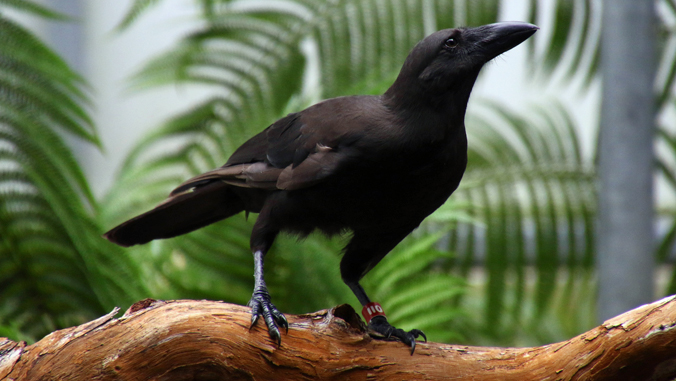
University of Hawaiʻi at Hilo researchers working to promote successful conservation of the critically endangered ʻalalā, or Hawaiian Crow, received a $50,000 Disney Conservation Fund award. The fund has been supporting local efforts around the world aimed at saving wildlife, inspiring action and protecting the planet.
An endemic species that was once found in forests throughout Hawaiʻi, the ʻalalā has been extinct in the wild since 2002. Through intensive conservation efforts, 16 ʻalalā raised in captivity have been released into native forests. It is unknown, however, whether birds raised in captivity have or can learn the social behaviors needed to live in the wild.
“Establishing a self-sustaining wild population of ʻalalā will require flexible and innovative management strategies,” said Kristina Paxton, adjunct assistant professor associated with the Listening Observatory for Hawaiian Ecosystems. “Thanks to this $50,000 award from the Disney Conservation Fund, we will be able to do intensive research in collaboration with The ʻAlalā Project, a partnership between the Hawaiʻi Department of Land and Natural Resources, San Diego Zoo Global and U.S. Fish and Wildlife Service, to find out if captive-reared ʻalalā are developing new vocalizations as they adapt to new situations encountered in the wild.”
ʻAlalā have complex and diverse vocalizations that are acquired through social learning over a bird’s lifetime. These vocalizations play an integral role in behaviors including avoiding predators, attracting a mate and establishing a territory. By researching the vocalizations and associated behaviors, teams working to save the ʻalalā will be able to better shape successful re-entry into the wild.
The award will also help build community awareness around the importance of forest conservation.
“Our work is perfectly suited for education and outreach by bringing the sounds of the forest to the people,” said Patrick Hart, a professor of biology collaborating on the project. “We will use the findings of our research to highlight conservation and science through the story of the ʻalalā and their vocal culture.”
The UH Hilo researchers are from the Tropical Conservation Biology and Environmental Sciences program and biology department.
For more on the ʻalalā research and the Disney Conservation Fund award go to the University of Hawaiʻi Foundation website.
Related UH News stories on UH Hilo’s work with the ʻalalā:

